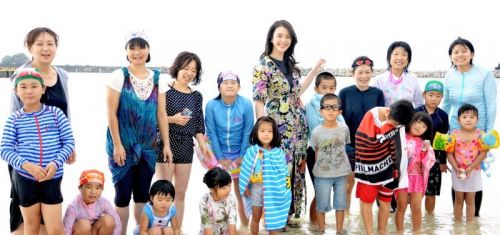Kids from Fukushima invited by Kurara Chibana to enjoy beach in Geruma

Geruma Camp participants from Fukushima and the founder Kurara Chibana
October 27, 2017 Ryukyu Shimpo
Twelve children between the age of four and eleven living in Fukushima prefecture and their six mothers were invited to the Geruma Camp at Geruma Island, Zamami Village in Okinawa on October 24 and 25.
The event has been carried out annually to support the people affected by the Fukushima Daiichi Nuclear crisis and the Great East Japan Earthquake.
The project was launched by Okinawan model, Kurara Chibana, in 2012. The participants enjoyed looking at the bottom of the beach and picking up shells.
One child tasted the sea water saying “I didn’t know the ocean tasted salty.” The children enjoyed the beach.
The Geruma Camp was started around Fall in 2011 after Chibana heard about mothers’ stories in Fukushima.
She learned about the concern of parents who could not allow their children to play around soil and water because they were worried about radiation contamination from the accident. Chibana then launched the project, saying, “I want to support the mothers who are trying to help their children.
Although it’s only for a short time, I want them to enjoy the nature in Okinawa as much as possible.” This year marks the sixth year of the event, and many of the children who visited Geruma island swam in the water for the first time after the disaster.
Ami, a five-years old daughter of Rie Naito from Iwaki City experienced the ocean for the first time.
The fourty-two year old mother had mixed feeling as she watched her daugter Ami jumping into the water.
She felt a sadness when her daughter said, ‘the sea tastes salty’. “I realized that she didn’t even know how sea water tasted”, she said.
A thirty-seven year old mother Toshie Tejima gave birth to her daughter four years ago at a clinic only seven kilometers away from the Fukushima Daiichi Nuclear Power Station.
They still live in temporary housing. Tejima said as she observed her daughter calmly, “every single day we worry about food.
The issues have not been solved, but we were releaved a little bit while we were in Okinawa. My daughter was smiling the whole time.”
Chibana says; “the concerns among mothers have gotten stronger over the past six years.
There are still many mothers who struggle and feel concerned about radioactive contamination.
Some people are not even able to raise their voice because they feel it would interrupt the recovery effort. I would like to continue the camp until people feel fully safe.”
(English translation by T&CT and Sayaka Sakuma)
Previous Article:Farewell Ringo, a female lion finishes her life at 18 years of age
Next Article:Former Prime Minister Hatoyama criticizes forced Henoko base construction
[Similar Articles]
- Twenty school children from Fukushima visit Okinawa to enjoy a summer camp
- First resort facility in Japan for children from Fukushima opens in Kumejima
- Association of mothers submits petition to eliminate harmful substances in water to OPG
- Hirokawa to operate facilities on Kumejima for 100 children from Fukushima
- Number of refugees from Fukushima to Okinawa on the rise
 Webcam(Kokusai Street)
Webcam(Kokusai Street)


